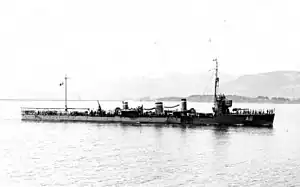 Sister ship Algérien in 1917 | |
| History | |
|---|---|
| Name | Bambara |
| Namesake | Bambara people |
| Ordered | 1916 |
| Builder | Kure Naval Arsenal, Kure, Japan |
| Laid down | 1917 |
| Launched | 20 June 1917 |
| Completed | 1917 |
| In service | 1917 |
| Stricken | 18 August 1933 |
| Fate | Scrapped after 1933 |
| General characteristics | |
| Class and type | Arabe-class destroyer |
| Displacement | 685 t (674 long tons) |
| Length | |
| Beam | 7.33 m (24 ft 1 in) |
| Draft | 2.39 m (7 ft 10 in) |
| Installed power |
|
| Propulsion | 3 shafts; 3 triple-expansion steam engines |
| Speed | 29 knots (54 km/h; 33 mph) |
| Range | 2,000 nmi (3,700 km; 2,300 mi) at 12 knots (22 km/h; 14 mph) |
| Complement | 109 |
| Armament |
|
The French destroyer Bambara was one of a dozen Arabe-class destroyers built for the French Navy in Japan during the First World War.
Design and description
The Arabe-class ships had an overall length of 82.26 meters (269 ft 11 in), a length between perpendiculars of 79.4 meters (260 ft 6 in) a beam of 7.33 meters (24 ft 1 in), and a draft of 2.39 meters (7 ft 10 in).[1] The ships displaced 865 metric tons (851 long tons) at normal load.[2] They were powered by three vertical triple-expansion steam engines, each driving one propeller shaft, using steam provided by four mixed-firing Kampon Yarrow-type boilers. The engines were designed to produce 10,000 metric horsepower (7,400 kW; 9,900 shp), which would propel the ships at 29 knots (54 km/h; 33 mph). During their sea trials, the Arabe class reached 29.16–30.44 knots (54.00–56.37 km/h; 33.56–35.03 mph).[3] The ships carried enough coal and fuel oil which gave them a range of 2,000 nautical miles (3,700 km; 2,300 mi) at 12 knots (22 km/h; 14 mph).[4] Their crew consisted of 5 officers and 104 crewmen.[5]
The main armament of the Arabe-class ships was a single Type 41 12-centimeter (4.7 in) gun, mounted before the bridge on the forecastle. Their secondary armament consisted of four Type 41 76-millimeter (3 in) guns in single mounts; two of these were positioned abreast the middle funnel and the others were on the centerline further aft. One of these latter guns was on a high-angle mount and served as an anti-aircraft gun. The ships carried two above-water twin mounts for 450-millimeter (17.7 in) torpedo tubes. In 1917–18, a rack for eight 75-kilogram (165 lb) depth charges was added.[6]
Construction and career
Bambara was ordered from Kure Naval Arsenal[4] and was launched on 20 June 1917 and was completed later that year. She was stricken on 18 August 1933 and subsequently broken up for scrap.[7]
Citations
References
- Couhat, Jean Labayle (1974). French Warships of World War I. London: Ian Allan. ISBN 0-7110-0445-5.
- Garier, Gérard (March 2001). "Les torpilleurs d'escadre français de construction japonaise: Le type 'Algérien' (1917 / 1936)". Navires & Historie. Lela Presse. 06: 33–51. ISSN 1280-4290.
- Roche, Jean-Michel (2005). "Classement par types". Dictionnaire des bâtiments de la flotte de guerre française de Colbert à nos jours 2, 1870 - 2006. Toulon: Roche. ISBN 978-2-9525917-0-6. OCLC 165892922.
- Smigielski, Adam (1985). "France". In Gray, Randal (ed.). Conway's All the World's Fighting Ships 1906–1921. Annapolis, Maryland: Naval Institute Press. pp. 190–220. ISBN 0-85177-245-5.